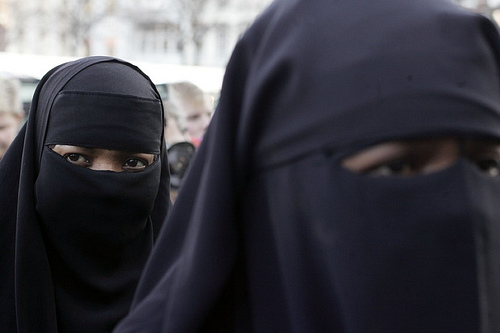While I don’t believe there’s anything like a law that good and evil have to be in balance, the headlines of the past few months seem to give that impression. Even as the countries of the West shed their theocratic past and progresses toward a brighter and more secular future, there’s never been a blacker time to be a freethinker in the Muslim world.
ISIS continues its rampage through Iraq and Syria, imposing theocracy through slaughter and erasing the cultural patrimony of the human race. Its newest conquest is the ancient and archaeologically priceless city of Palmyra, now in the path of destruction like others before it.
Meanwhile in Bangladesh, atheist bloggers are being hacked to death in the streets by Islamist thugs while the government sits on its hands. Just after I wrote about the horrific murder of Dr. Avijit Roy in March, two more secular writers, Washiqur Rahman and Ananta Bijoy Das, were killed. Many of the atheists who remain in Bangladesh are in hiding, afraid that their nominally secular, democratic country is sliding into Taliban-like fundamentalism. This would be a huge loss for a land with an ancient and proud tradition of freethinking:
Rejections of faith, questioning and godlessness are as indigenous to this region as is the staple food, rice. As early as 600 BC the ideas of Carvaka, a philosophy that rejected then-predominant Hinduism, Buddhism and Jainism, was openly debated and contemplated.
But in spite of horrors like these, the news isn’t all bleak. There’s an iron curtain of theocracy that stretches across the Islamic world, especially the Arab nations, which maintains the official fiction that no one lives in these places except faithful Muslims. But the truth is that atheism is alive and well behind that curtain, despite all attempts by the rulers to stamp it out.
As reported by Ahmed Benchemsi in the New Republic, the powerful Dar al-Ifta religious institution absurdly claimed that there are less than 3,000 atheists in the entire Arab world, combined population 300 million. The reality is that atheists are far more numerous in Arab nations than the authorities would like to admit, even if many of them have to keep quiet about their disbelief or seek refuge in anonymity:
Large numbers of individuals are tilting away from the rote religiosity Westerners reflexively associate with the Arab world. In 2012, a wide-ranging WIN/Gallup International poll found that 5 percent of Saudi citizens — more than a million people — self-identify as “convinced atheists,” the same percentage as in the United States. Nineteen percent of Saudis — almost six million people — think of themselves as “not a religious person.” (In Italy, the figure is 15 percent.)
… “My guess is, every Egyptian family contains an atheist, or at least someone with critical ideas about Islam,” an atheist compatriot, Momen, told Egyptian historian Hamed Abdel-Samad recently. “They’re just too scared to say anything to anyone.”
As the article points out, these percentages are especially impressive considering that most Arab countries have sharia laws that decree prison, torture or execution as the punishment for disbelief. In addition to these draconian laws, social control is also accomplished through customs which insist that atheism isn’t just a personal philosophical stance, but a rejection of the whole order of family, culture and morals (the most common term for atheist, mulhid, literally means “deviant”).
Yet all this pressure combined hasn’t been enough to silence the voices of disbelief. On average, one in five Arab people express some degree of religious doubt, even more in some countries like Tunisia and Lebanon. Most ex-Muslims came to their atheism the same way as ex-Christians in the West: becoming aware of the fallacies and contradictions of theology, or firsthand experience with the cruelty and absurdity of fundamentalism. And while a sort of benign hypocrisy about religion is widespread, making a public argument for atheism is rarely tolerated. Incredibly brave freethinkers like Hamza Kashgari, Imad Iddine Habib and Raif Badawi have faced – in some cases are still facing – prison time and death over mere tweets, cartoons or blog posts.
Even within Muslim communities in Western countries, where the danger of blasphemy laws doesn’t hang overhead, ex-Muslims have to resist immense social pressure. That’s the message of this long, outstanding Guardian article, Losing their religion: the hidden crisis of faith among Britain’s young Muslims:
As Simon Cottee, author of a new book The Apostates: When Muslims Leave Islam, says: “In the western context, the biggest risk ex-Muslims face is not the baying mob, but the loneliness and isolation of ostracism from loved ones. It is stigma and rejection that causes so many ex-Muslims to conceal their apostasy.”
Like the gay liberation movement of a previous generation, Muslim apostates have to fight for the right to be recognised while knowing that recognition brings shame, rejection, intimidation and, very often, family expulsion.
…Vali has seen his mother just once for a few minutes four years ago. “She didn’t want to touch me,” he says. “She thought her God would be angry with her if she treated me kindly.”
Although the Arab Spring failed everywhere except Tunisia, it seems inevitable that there will eventually be a democratic revolution in the rest of the Arab world. Whether it will be another ten years or another two hundred, I wouldn’t even want to guess. It’s likely that the relative progress of the West has delayed it by acting like a safety valve, allowing secular dissidents to leave for other countries instead of staying and making trouble in their own. But at the same time, that allows those dissidents to incubate new ideas and export them back to their home countries. Together with evidence that freethought is secretly thriving in even the harshest Islamic theocracies, I have reason to hope that it’s only a matter of time before these walls of dogma crumble like all the rest.
Image credit: ulania, released under CC BY-ND 2.0 license
